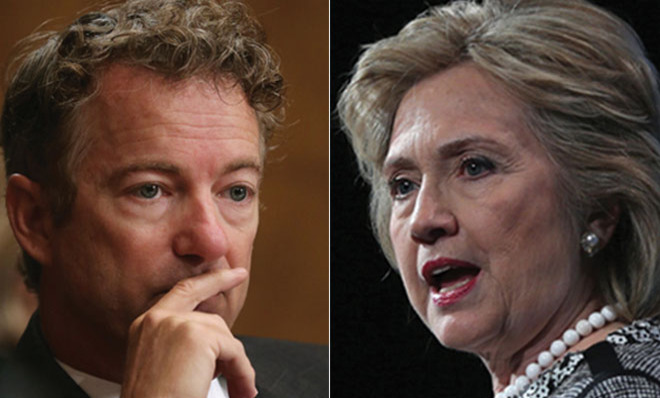Rand Paul's revealing critique of Hillary Clinton
The senator from Kentucky doesn't believe in man-made climate change. But his recent remarks provided a useful framework for looking at the issue.


A free daily email with the biggest news stories of the day – and the best features from TheWeek.com
You are now subscribed
Your newsletter sign-up was successful
As the 2016 presidential election continues its inexorable plod toward an actual primary, climate change–conscious observers were briefly energized last week when the issue occasioned a public disagreement between Sen. Rand Paul (R-Ky.) and former Secretary of State Hillary Clinton.
Paul was skeptical of Clinton's assertion, made in a speech at the National Clean Energy Summit in Las Vegas, that climate change represented "the most consequential, urgent, sweeping collection of challenges we face." Paul's response was quite revealing, not only for what it shows about Paul's own feelings toward climate change, but also for the larger question of where climate change sits in a hierarchy of threats facing the U.S.
After Clinton's speech, Paul appeared on Fox News, where he made two related statements about climate change. One was a very general criticism of Clinton for contending that climate change is a serious threat:
The Week
Escape your echo chamber. Get the facts behind the news, plus analysis from multiple perspectives.

Sign up for The Week's Free Newsletters
From our morning news briefing to a weekly Good News Newsletter, get the best of The Week delivered directly to your inbox.
From our morning news briefing to a weekly Good News Newsletter, get the best of The Week delivered directly to your inbox.
For her to be out there saying that the biggest threat to our safety and to our well-being is climate change, I think, goes to the heart of the matter or whether or not she has the wisdom to lead the country, which I think it's obvious that she doesn't. [Politico]
The second was tied to one of the most pressing security concerns facing the United States, the rapid advance of the Islamic State of Iraq and Syria (ISIS):
I don't think we really want a commander-in-chief who's battling climate change instead of terrorism. [Politico]
Paul denies the existence of man-made climate change, period. With such a position, his specific views on environmental policy are more or less immaterial. But his second statement is worthy of fuller exploration, since the juxtaposition between climate change and "real" security threats like terrorism is bound to come up again come 2016.
Growing recognition of the security threat
As Jeff Spross of ThinkProgress and The New Republic's Rebecca Leber were quick to point out, Clinton is hardly the only senior policy-maker concerned about the security implications of climate change. Both cite Pentagon strategy documents that predict the effects of climate change will be "threat multipliers that will aggravate stressors abroad such as poverty, environmental degradation, political instability, and social tensions — conditions that can enable terrorist activity and other forms of violence."
A free daily email with the biggest news stories of the day – and the best features from TheWeek.com
Contra Paul, that means future presidential administrations will have to spend a lot of time figuring out a strategy for dealing with it, beginning with a general idea of how it fits into a constellation of foreign policy priorities. Most sensible people — those who acknowledge the scientific consensus — believe the president should be prepared to combat climate change and terrorism, not to mention the rise of China, the proliferation of weapons of mass destruction, and Russian-backed rebels in Ukraine.
So while climate change is increasingly recognized as a clear national security concern, where should it sit in the larger list of priorities? How should any administration balance a problem whose urgency is growing, but whose worst effects are still over the horizon? And how can this be done when there are so many emergencies sucking up the bandwidth of policy-makers?
Current action — and inaction
The Obama administration, for one, clearly takes it seriously, pushing forward despite a bevy of geopolitical crises and stringent domestic political limitations. Its climate negotiators have been working overtime to ensure they come home from Paris in 2015 with an international accord (don't call it a treaty!) to slow the growth in carbon emissions. Its aid priorities are focused on helping poorer countries adapt to the future effects of climate change. The Pentagon, meanwhile, is trying to prepare U.S. military forces for various contingencies.
Yet even these steps do not convey adequately the urgency of the problem, nor the extent to which we are missing many of the tools needed to make the fight winnable. Climate change is still background noise to what we consider first-order threats, some of which are clearly worthy of appropriate concern. Sooner or later, however, climate change will become a larger part of our daily headline reading.
This week, the United Nations' World Meteorological Organization announced that 2013 saw the largest year-on-year increase in atmospheric concentrations of carbon dioxide, which, as the Financial Times reported, is a worrying sign that we are exceeding the planet's capacity to traditionally store carbon safely in our oceans and forests. There exists no international legal framework governing the status of "climate refugees" — populations forced to leave their homes in the face of more frequent extreme weather, a particular concern for small island states. And while there is a burgeoning private movement to divest equity investments from fossil fuel companies, there is very little traction among governments when it comes to phasing out fossil fuel subsidies.
These are just some of the critical challenges we must address, and they are every bit as real as ISIS or Iran's nuclear program, even if their worst effects are mere decades away, instead of staring us in the face. A credible answer to climate change will require far-reaching changes in our business-as-usual approach. Unfortunately, this reality remains virtually ignored in the national debate.
The next president's agenda
Those seeking the highest office in the land in 2016 would do us all a favor by making their thoughts clearer on the extent to which they agree that there is a need for more immediate and far-ranging action. Politicians participating in a presidential election in which some forecast $2 billion will be spent owe the voting public much more specific information than has so far been offered during this shadow campaign phase.
And while Sen. Paul has not started the conversation on the strongest foot, he has at least been helpful in kicking off the discussion. We can only hope that it is merely the first step in a dialogue that eventually puts climate change firmly in the upper rank of threats.
Neil Bhatiya is a Policy Associate at The Century Foundation, where he works on issues related to U.S. foreign policy, with a specific focus on South Asia and climate change.
-
 How the FCC’s ‘equal time’ rule works
How the FCC’s ‘equal time’ rule worksIn the Spotlight The law is at the heart of the Colbert-CBS conflict
-
 What is the endgame in the DHS shutdown?
What is the endgame in the DHS shutdown?Today’s Big Question Democrats want to rein in ICE’s immigration crackdown
-
 ‘Poor time management isn’t just an inconvenience’
‘Poor time management isn’t just an inconvenience’Instant Opinion Opinion, comment and editorials of the day
-
 The billionaires’ wealth tax: a catastrophe for California?
The billionaires’ wealth tax: a catastrophe for California?Talking Point Peter Thiel and Larry Page preparing to change state residency
-
 Bari Weiss’ ‘60 Minutes’ scandal is about more than one report
Bari Weiss’ ‘60 Minutes’ scandal is about more than one reportIN THE SPOTLIGHT By blocking an approved segment on a controversial prison holding US deportees in El Salvador, the editor-in-chief of CBS News has become the main story
-
 Has Zohran Mamdani shown the Democrats how to win again?
Has Zohran Mamdani shown the Democrats how to win again?Today’s Big Question New York City mayoral election touted as victory for left-wing populists but moderate centrist wins elsewhere present more complex path for Democratic Party
-
 Millions turn out for anti-Trump ‘No Kings’ rallies
Millions turn out for anti-Trump ‘No Kings’ ralliesSpeed Read An estimated 7 million people participated, 2 million more than at the first ‘No Kings’ protest in June
-
 Ghislaine Maxwell: angling for a Trump pardon
Ghislaine Maxwell: angling for a Trump pardonTalking Point Convicted sex trafficker's testimony could shed new light on president's links to Jeffrey Epstein
-
 The last words and final moments of 40 presidents
The last words and final moments of 40 presidentsThe Explainer Some are eloquent quotes worthy of the holders of the highest office in the nation, and others... aren't
-
 The JFK files: the truth at last?
The JFK files: the truth at last?In The Spotlight More than 64,000 previously classified documents relating the 1963 assassination of John F. Kennedy have been released by the Trump administration
-
 'Seriously, not literally': how should the world take Donald Trump?
'Seriously, not literally': how should the world take Donald Trump?Today's big question White House rhetoric and reality look likely to become increasingly blurred
